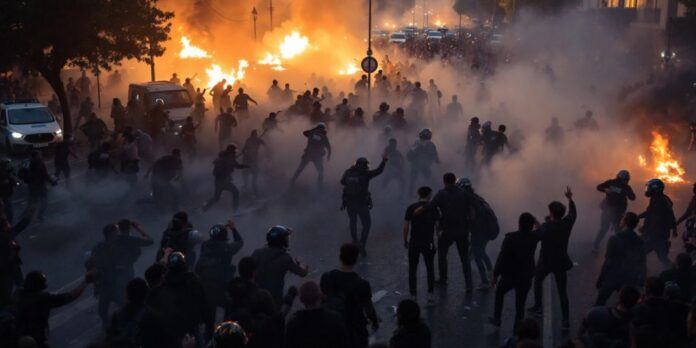Nights of unrest have unfolded in Lisbon for the past week, following the police killing on October 21 of Odair Moinz, a 43-year-old Cape Verdean father of two. Authorities initially claimed that Odair was stopped while driving a “stolen car”—which was, in fact, his own. They further alleged that a PSP officer opened fire after Odair “resisted arrest and wielded a weapon in an attempt to attack them.” However, this version of events was contradicted by CCTV footage.
Key Takeaways
- Odair Moinz, a father of two, was killed by police on October 21.
- Initial police claims about the incident were contradicted by CCTV footage.
- Protests have erupted across multiple neighborhoods in Lisbon.
- Activists highlight a pattern of police violence and racism in Portugal.
- Thousands have demanded justice and an end to police brutality.
The incident prompted dozens of residents from Zambujal, a neighborhood in Amadora, to gather since last Tuesday afternoon on Rua das Galegas, near the 64th PSP Police Station, demanding justice for Odair’s death. During the protest, a bus was set on fire, and police blocked residents from further advancing. Clashes have since spread to other neighborhoods, including Carnaxide, Sintra, Campo de Ourique, Loures, and Odivelas.
Portuguese authorities have intensified policing in the so-called “Sensitive Urban Zones” and deployed Intervention Corps and Rapid Intervention teams. The SOS Racismo platform has condemned the killing as another case in the long list of police violence by the notorious Public Security Police (PSP).
According to community activists, state violence has been normalized in the Portuguese capital, with lax oversight and a culture of impunity defining how the PSP operates in these situations. Police brutality has become a routine approach, especially in areas inhabited by black people, where officers frequently disregard legal protocols and regulations intended to govern their conduct.
This weekend, thousands of people took to the streets of Lisbon to demand an end to police brutality, while right-wing groups seized the opportunity to make themselves visible and call for the defense of the murderers. Rights groups changed the route to avoid clashes with supporters of the far-right anti-immigration party Chega, which held a separate smaller rally also in central Lisbon in support of the police, Reuters reported.

